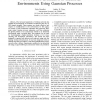Free Online Productivity Tools
i2Speak
i2Symbol
i2OCR
iTex2Img
iWeb2Print
iWeb2Shot
i2Type
iPdf2Split
iPdf2Merge
i2Bopomofo
i2Arabic
i2Style
i2Image
i2PDF
iLatex2Rtf
Sci2ools
139
click to vote
IROS
2008
IEEE
2008
IEEE
WiFi position estimation in industrial environments using Gaussian processes
—The increased popularity of wireless networks has enabled the development of localization techniques that rely on WiFi signal strength. These systems are cheap, effective, and require no modifications to the environment. In this paper, we present a WiFi localization algorithm that generates WiFi maps using Gaussian process regression, and then estimates the global position of an autonomous vehicle in an industrial environment using a particle filter. This estimate can be used for bootstrapping a higher-resolution localizer, or for crosschecking and localization redundancy. The system has been designed to operate both indoors and outdoors, using only the existing wireless infrastructure. It has been integrated with an existing laser-beacon localizer to aid during initialization and for recovery after a failure. Experiments conducted at an industrial site using a large forklift-type autonomous vehicle are presented.
Related Content
| Added | 31 May 2010 |
| Updated | 31 May 2010 |
| Type | Conference |
| Year | 2008 |
| Where | IROS |
| Authors | Felix Duvallet, Ashley D. Tews |
Comments (0)

